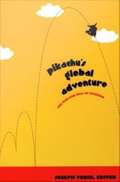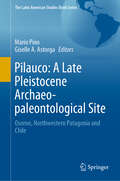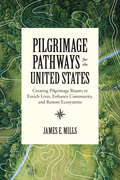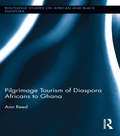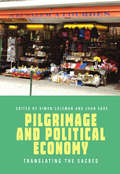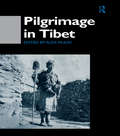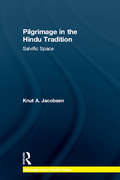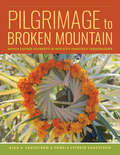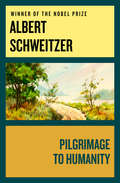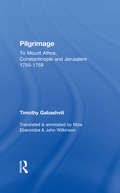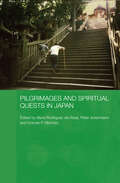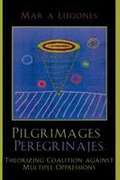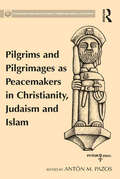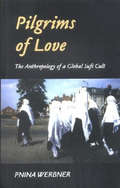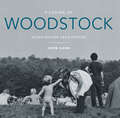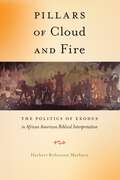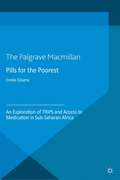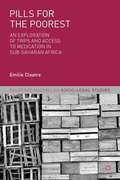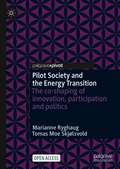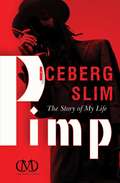- Table View
- List View
Pikachu's Global Adventure: The Rise and Fall of Pok mon
by Joseph TobinInitially developed in Japan by Nintendo as a computer game, Pokmon swept the globe in the late 1990s. Based on a narrative in which a group of children capture, train, and do battle with over a hundred imaginary creatures, Pokmon quickly diversified into an array of popular products including comic books, a TV show, movies, trading cards, stickers, toys, and clothing. Pokmon eventually became the top grossing children's product of all time. Yet the phenomenon fizzled as quickly as it had ignited. By 2002, the Pokmon craze was mostly over. Pikachu's Global Adventure describes the spectacular, complex, and unpredictable rise and fall of Pokmon in countries around the world. In analyzing the popularity of Pokmon, this innovative volume addresses core debates about the globalization of popular culture and about children's consumption of mass-produced culture. Topics explored include the origins of Pokmon in Japan's valorization of cuteness and traditions of insect collecting and anime; the efforts of Japanese producers and American marketers to localize it for foreign markets by muting its sex, violence, moral ambiguity, and general feeling of Japaneseness; debates about children's vulnerability versus agency as consumers; and the contentious question of Pokmon's educational value and place in school. The contributors include teachers as well as scholars from the fields of anthropology, media studies, sociology, and education. Tracking the reception of Pokmon in Japan, the United States, Great Britain, France, and Israel, they emphasize its significance as the first Japanese cultural product to enjoy substantial worldwide success and challenge western dominance in the global production and circulation of cultural goods. Contributors. Anne Allison, Linda-Rene Bloch, Helen Bromley, Gilles Brougere, David Buckingham, Koichi Iwabuchi, Hirofumi Katsuno, Dafna Lemish, Jeffrey Maret, Julian Sefton-Green, Joseph Tobin, Samuel Tobin, Rebekah Willet, Christine Yano
Pilauco: Osorno, Northwestern Patagonia and Chile (The Latin American Studies Book Series)
by Mario Pino Giselle A. AstorgaThis volume combines 10 years of accomplished research at the Pilauco site. The studies are focused on a variety of scientific areas including geological, sedimentological, geomorphological and paleobotanical topics, as well as paleontology of vertebrata and invertebrata, micropaleontology, archaeology, biochemistry, taxonomy, taphonomy, astrophysics and the development of some particular touristic aspects. In 18 chapters a variety of authors describe the excavation and investigation of this unique location. The book presents Pilauco as an example for the natural laboratory which can be found in South America, a testing ground for many of the hypotheses regarding migrations of animals and humans. In this context the study of topics, such as the paleozoography, the role of megafauna species for the architecture of the forests, the animal extinctions or the early human settlements, is extremely important on a global scale. The Pilauco site features paleontological and archaeological evidences and is contemporaneous with the Monte Verde site (~ 15,000 cal. yr AP). It is located 100 km north from Monte Verde and lies within the Intermediate Depression in northwestern Chilean Patagonia. It was discovered by chance in 1986 and has been excavated and investigated since 2007.
Pilgrimage Pathways for the United States: Creating Pilgrimage Routes to Enrich Lives, Enhance Community, and Restore Ecosystems
by James E. MillsAn inspirational argument for the creation of a new pilgrimage tradition in the United States.Pilgrimage is a sacred tradition that has existed around the world for centuries. Every year, more than one hundred million devotees from different cultures and faiths embark on journeys to such holy sites as Santiago de Compostela, Mecca, and Banaras. For some, making a pilgrimage is a spiritual act, while for others it is a secular experience of personal restoration. And yet there has never existed a tradition of pilgrimage within the United States.Cultural geographer James E. Mills makes a compelling case for the creation of a network of American pilgrimage routes to heal societal divisions and foster a new ethos of humanitarianism and environmentalism. He also addresses practical considerations for the development, ownership, and administration of future routes. Pilgrimage Pathways for the United States is for anyone considering a pilgrimage and for those of us who are interested in connecting and protecting our natural world, including environmentalists, interfaith clergy, political leaders, community developers, and activists.
Pilgrimage Tourism of Diaspora Africans to Ghana (Routledge Studies on African and Black Diaspora #6)
by Ann ReedProcesses of globalization have led to diasporic groups longing for their homelands. One such group includes descendants from African ancestors displaced by the trans-Atlantic slave trade, who may be uncertain about their families' exact origins. Traveling home often means visiting African sites associated with the slave trade, journeys full of expectations. The remembrance of the slave trade and pilgrimages to these heritage sites bear resemblance to other diasporic travels that center on trauma, identification, and redemption. Based on over two years of ethnographic fieldwork with both diaspora Africans and Ghanaians, this book explores why and how Ghana has been cast as a pilgrimage destination for people of African descent, especially African Americans. Grounding her research in Ghana’s Central Region where slavery heritage tourism and political ideas promoting incorporation into one African family are prominent, Reed also discusses the perspectives of ordinary Ghanaians, tourism stakeholders, and diasporan "repatriates." Providing ethnographic insight into the transnational networks of people and ideas entangled in Ghana’s pilgrimage tourism, this book also contributes to better understanding the broader global phenomenon of diasporic travel to homeland centers.
Pilgrimage and England's Cathedrals: Past, Present, and Future
by John Jenkins Dee Dyas"A brilliant breakthrough in pilgrimage studies. An exemplary study that shows how to bring together different academic and institutional interests in a common cause – understanding the relationship between pilgrimage and English cathedrals over time. A publication that will, hopefully, inspire similar collaborative studies around the globe."- John Eade, Professor of Sociology and Anthropology, University of Roehampton, UK"People who oversee, minister, lead worship, guide, welcome, manage, market, promote and maintain cathedrals will find this book an indispensable treasure. It is aware of the awesome complexity inherent in cathedral life but it doesn’t duck the issues: its clear-eyed focus is on the way people experience cathedrals and how these extraordinary holy places can speak and connect with all the diversity represented by the people who come to them. In a spiritually-hungry age, this book shows us how to recognise and meet that hunger. This book will be required reading for all us “insiders” trying to invite and signpost access to holy ground."- The Very Reverend Adrian Dorber, Dean of Lichfield, Chair of the Association of English CathedralsThis book looks at England's cathedrals and their relationship with pilgrimage throughout history and in the present day. The volume brings together historians, social scientists, and cathedral practitioners to provide groundbreaking work, comprising a historical overview of the topic, thematic studies, and individual views from prominent clergy discussing how they see pilgrimage as part of the contemporary cathedral experience.
Pilgrimage and Political Economy: Translating the Sacred
by Simon Coleman John EadePilgrimage has always had a tendency to follow—and sometimes create—trade routes. This volume explores how wider factors behind transnational and global mobility have impacted on pilgrimage activity across the world, and examines the ways in which pilgrimage relates to migration, diaspora, and political cooperation or conflict across nation-states. Furthermore, it brings together case studies that explore forms of mobility where pilgrimage is juxtaposed, complements, or is in intimate association with other forms of movement.
Pilgrimage in Tibet
by Alex McKayThe Western image of Tibet as a sacred land is in many ways a mythical construction. But the Tibetans themselves have traditionally mapped out their land in terms of areas of sacred space, and pilgrimage, ensuring a high degree of mobility within all classes of Tibetan society. Pilgrims travelled to local, regional, and national centres throughout recorded Tibetan history. In recent years, pilgrimage has resumed in areas where it had been forbidden by the Chinese authorities, and has now become one of the most prominent religious expressions of Tibetan national identity.In this major new work, leading scholars of Asian pilgrimage traditions discuss historical and contemporary aspects of pilgrimage within the Tibetan cultural world. Myths and legends, material conditions, textual sources, a modern pilgrim's impressions, political and economic influences, biographies and contemporary developments - all these and many other issues are examined here. The result is an informative and often entertaining work which contributes greatly to our knowledge of the history and culture of Tibet as well as the wider issues of religious power and practice.
Pilgrimage in the Hindu Tradition: Salvific Space (Routledge Hindu Studies Series)
by Knut A. JacobsenSalvific space is one of the central ideas in the Hindu traditions of pilgrimage, and concerns the ability of space, especially sites associated with bodies of water such as rivers and lakes, to grant salvific rewards. Focusing on religious, historical and sociological questions about the phenomenon, this book investigates the narratives, rituals, history and structures of salvific space, and looks at how it became a central feature of Hinduism. Arguing that salvific power of place became a major dimension of Hinduism through a development in several stages, the book analyses the historical process of how salvific space and pilgrimage in the Hindu tradition developed. It discusses how the traditions of salvific space exemplify the decentred polycentrism that defines Hinduism. The book uses original data from field research, as well as drawing on main textual sources such as Mahābhārata, the Purāṇas, the medieval digests on pilgrimage places (tīrthas), and a number of Sthalapurāṇas and Māhātmyas praising the salvific power of the place. By looking at some of the contradictions in and challenges to the tradition of Hindu salvific space in history and in contemporary India, the book is a useful study on Hinduism and South Asian Studies.
Pilgrimage to Broken Mountain: Nahua Sacred Journeys in Mexico's Huasteca Veracruzana
by Alan R. Sandstrom Pamela Effrein SandstromAn ethnographic study based on decades of field research, Pilgrimage to Broken Mountain explores five sacred journeys to the peaks of venerated mountains undertaken by Nahua people living in northern Veracruz, Mexico. Punctuated with elaborate ritual offerings dedicated to the forces responsible for rain, seeds, crop fertility, and the well-being of all people, these pilgrimages are the highest and most elaborate form of Nahua devotion and reveal a sophisticated religious philosophy that places human beings in intimate contact with what Westerners call the forces of nature. Alan and Pamela Sandstrom document them for the younger Nahua generation, who live in a world where many are lured away from their communities by wage labor in urban Mexico and the United States. Pilgrimage to Broken Mountain contains richly detailed descriptions and analyses of ritual procedures as well as translations from the Nahuatl of core myths, chants performed before decorated altars, and statements from participants. Particular emphasis is placed on analyzing the role of sacred paper figures that are produced by the thousands for each pilgrimage. The work contains drawings of these cuttings of spirit entities along with hundreds of color photographs illustrating how they are used throughout the pilgrimages. The analysis reveals the monist philosophy that underlies Nahua religious practice in which altars, dancing, chanting, and the paper figures themselves provide direct access to the sacred. In the context of their pilgrimage traditions, the ritual practices of Nahua religion show one way that people interact effectively with the forces responsible for not only their own prosperity but also the very survival of humanity. A magnum opus with respect to Nahua religion and religious practice, Pilgrimage to Broken Mountain is a significant contribution to several fields, including but not limited to Indigenous literatures of Mesoamerica, Nahuatl studies, Latinx and Chicanx studies, and religious studies.
Pilgrimage to Humanity
by Albert SchweitzerThe dimensions of the central theme are illuminated by Schweitzer&’s discussions of his philosophy of culture, the course of his life, his ministry to human needs in Africa, the idea of reverence for life, the ideal of world peace, the significance of liberal Christianity, and the lives, world-views, and contributions of Johann Goethe, J. S. Bach, and Jesus of Nazareth. The pages of these selections give a remarkable revelation of the creative spirit of a modern saint and philosopher. The translation is by Water E. Stuermann, University of Tulsa.
Pilgrimage to Humanity: The Essence Of Faith, Pilgrimage To Humanity, The Quest Of The Historical Jesus, And The Light Within Us (Paperback Ser.)
by Albert SchweitzerThe dimensions of the central theme are illuminated by Schweitzer&’s discussions of his philosophy of culture, the course of his life, his ministry to human needs in Africa, the idea of reverence for life, the ideal of world peace, the significance of liberal Christianity, and the lives, world-views, and contributions of Johann Goethe, J. S. Bach, and Jesus of Nazareth. The pages of these selections give a remarkable revelation of the creative spirit of a modern saint and philosopher. The translation is by Water E. Stuermann, University of Tulsa.
Pilgrimage: Timothy Gabashvili's Travels to Mount Athos, Constantinople and Jerusalem, 1755-1759 (Caucasus World #Vol. 167)
by John Wilkinson Mzia EbanoidzeA remarkable record of a pilgrimage through Turkey, Greece and the Levant. The Introduction examines the historical background to his travels and life, which ended in poverty and exile. Also included are a historically annotated gazetteer and extensive bibliography.
Pilgrimages and Spiritual Quests in Japan (Japan Anthropology Workshop Series)
by Dolores P. Martinez Maria Rodríguez del Alisal Peter AckermannThis exciting new book is a detailed examination of pilgrimages in Japan, including the meanings of travel, transformation, and the discovery of identity through encounters with the sacred, in a variety of interesting dimensions in both historical and contemporary Japanese culture, linked by the unifying theme of a spiritual quest. Several fascinating new approaches to traditional forms of pilgrimage are put forward by a wide range of specialists in anthropology, religion and cultural studies, who set Japanese pilgrimage in a wider comparative perspective. They apply models of pilgrimage to quests for vocational fulfilment, examining cases as diverse as the civil service, painting and poetry, and present ethnographies of contemporary reconstructions of old spiritual quests, as conflicting (and sometimes global) demands impinge on the time and space of would-be pilgrims.
Pilgrimages/Peregrinajes: Theorizing Coalition Against Multiple Oppressions (Feminist Constructions Series)
by María LugonesThe author has collected some of her most famous essays, as well as some lesser-known gems, in this book. She writes from her own perspective as an inhabitant of a number of different 'worlds.' Born in Argentina but living for a number of years in the United States, she sees herself as neither quite a U.S. citizen, nor quite an Argentine. An activist against the oppression of Latino/a people by the dominant U.S. culture, she is also an academic participating in the privileges of that culture. A lesbian, she experiences homophobia in both Anglo and Latino world. A woman, she moves uneasily in the world of patriarchy. She writes out of multiple and conflicting subjectivities that shape her sense of who she is, resisting the demand for a unified self in light of her necessary ambiguities. The book explores the possibility of deep coalition with other women of color, based on 'multiple understandings of oppressions and resistances'―understandings whose logic she subjects to philosophical investigation.
Pilgrims and Pilgrimages as Peacemakers in Christianity, Judaism and Islam (Compostela International Studies in Pilgrimage History and Culture)
by Antón M. PazosPilgrimages can be analysed as acts of conflict - such as the Crusades - or also as platforms for relationship building and rapprochement between religions. With a set of contributions from leading experts in the field, this book explores the concept of pilgrimage in Christianity, Judaism and Islam. Some specific examples of pilgrimages that helped to strengthen links between different religions or civilisations are explored, ranging from Europe to Asia and from the Middle Ages to the twentieth century. Even though every pilgrimage that is investigated here has helped to link different worlds, the case studies show that this relationship rarely led to a better in inter-understanding. Nowadays, peaceful coexistence seems to be its greatest achievement.
Pilgrims of Love: The Anthropology of a Global Sufi Cult
by Pnina Werbner"... will be of interest not only to those concerned with Pakistan and the new Muslim presence in Europe, but also to those interested in an anthropological study of religion." --Barbara Metcalf, University of California, DavisPnina Werbner traces the development of a Sufi Naqshbandi order founded by a living saint, Zindapir, whose cult originated in Pakistan and has extended globally to Britain, Europe, the Middle East, and southern Africa. Drawing on 12 years of fieldwork in Pakistan and Great Britain, she elucidates the complex organization of Sufi orders as regional and transnational cults, and examines how such cults are manifested through ritual action and embodied in sacred mythology and global diasporas. A focus of the study is the key event in the order's annual ritual cycle, a celebration in which tens of thousands of people gather at the saint's lodge in Pakistan and in the streets of Britain. Werbner challenges accepted anthropological and sociological truths about Islam and modernity, and reflects on her own role as ethnographic observer. Pilgrims of Love is a major contribution to our understanding of disaporic Islamic practices, highlighting the vitality of Sufi orders in the postcolonial world.
Pilgrims of Woodstock: Never-Before-Seen Photos
by John KaneIntimate portraits by photojournalist Richard F. Bellak of the musical festival&’s counterculture attendees celebrating peace, love, and rock and roll. In the summer of 1969, 400,000 people from across the country came together and redefined the music scene forever. Though the legacy and lore of Woodstock lives on in the memory of its attendees, a new generation can experience the real and unedited festival through Richard Bellak&’s never-before-seen photographs and John Kane&’s incredible new interviews.Pilgrims of Woodstock offers a vivid and intimate portrait of the overlooked stars of the festival: the everyday people who made Woodstock unforgettable. The photographs and interviews capture attendees&’ profound personal moments across hundreds of acres of farmland, as they meditated, played music, cooked food at night, and congregated around campfires. For three days, they helped and relied on each other in peace and harmony. For most, it was a life-changing event. Now, after the 50th anniversary of the famed festival, relive their experiences firsthand in Pilgrims of Woodstock.
Pillars of Cloud and Fire: The Politics of Exodus in African American Biblical Interpretation (Religion and Social Transformation #8)
by Herbert Robinson MarburyAt the birth of the United States, African Americans were excluded from the newly-formed Republic and its churches, which saw them as savage rather than citizen and as heathen rather than Christian. Denied civil access to the basic rights granted to others, African Americans have developed their own sacred traditions and their own civil discourses. As part of this effort, African American intellectuals offered interpretations of the Bible which were radically different and often fundamentally oppositional to those of many of their white counterparts. By imagining a freedom unconstrained, their work charted a broader and, perhaps, a more genuinely American identity. In Pillars of Cloud and Fire, Herbert Robinson Marbury offers a comprehensive survey of African American biblical interpretation. Each chapter in this compelling volume moves chronologically, from the antebellum period and the Civil War through to the Harlem Renaissance, the civil rights movement, the black power movement, and the Obama era, to offer a historical context for the interpretative activity of that time and to analyze its effect in transforming black social reality. For African American thinkers such as Absalom Jones, David Walker, Zora Neale Hurston, Frances E. W. Harper, Adam Clayton Powell, and Martin Luther King, Jr., the exodus story became the language-world through which freedom both in its sacred resonance and its civil formation found expression. This tradition, Marbury argues, has much to teach us in a world where fundamentalisms have become synonymous with “authentic” religious expression and American identity. For African American biblical interpreters, to be American and to be Christian was always to be open and oriented toward freedom.
Pillboxes and Tank Traps
by Bernard LowryThe very real threat of the invasion of Britain in 1940 initiated a huge military construction program. Around the vulnerable coasts of the country, as well as inland, were built thousands of pillboxes, anti-tank barriers and other obstacles to defeat or delay the invader. The end of WWII saw much cleared away but sufficient still remains, and this book guides the curious in identifying the remaining defensive structures and features which once formed part of the military landscape. Although, to our eyes, the survivals might seem randomly placed, there was always a considered plan and the book describes how these plans worked. Previously little appreciated, a national project (The Defence of Britain) has now identified many of the sites and there is a growing movement to protect what remains.
Pills for the Poorest: An Exploration of TRIPS and Access to Medication in Sub-Saharan Africa (Palgrave Socio-Legal Studies)
by E. CloatreThe desperate need for a vast part of the global population to access better medicines in more certain ways is one of the biggest concerns of the modern era. Pills for the Poorest offers a new perspective on the much-debated issue of the links between intellectual property and access to medication. Using ethnographic case studies in Djibouti and Ghana, and insights from actor-network theory, it explores the ways in which TRIPs and pharmaceutical patents are translated in the daily practices of those who purchase, distribute, and use (or fail to use) medicines in sub-Saharan Africa. It suggests that focusing on routine practices and the material deployment of intellectual property significantly enriches our understanding of the complex dynamics that animate the field of access to medicines and helps relocate the role of law within those processes. It demonstrates how intellectual property affects access to medicines in ways that are often discreet, indirect and forgotten. By exploring these complex mechanisms, it seeks to ask questions about the modes of actions of pharmaceutical patents, but also, more generally, about the complexity of legal objects.
Pills for the Poorest: An Exploration of TRIPS and Access to Medication in Sub-Saharan Africa (Palgrave Socio-Legal Studies)
by Emilie CloatreThe desperate need for a vast part of the global population to access better medicines in more certain ways is one of the biggest concerns of the modern era. Pills for the Poorest offers a new perspective on the much-debated issue of the links between intellectual property and access to medication. Using ethnographic case studies in Djibouti and Ghana, and insights from actor-network theory, it explores the ways in which TRIPs and pharmaceutical patents are translated in the daily practices of those who purchase, distribute, and use (or fail to use) medicines in sub-Saharan Africa. It suggests that focusing on routine practices and the material deployment of intellectual property significantly enriches our understanding of the complex dynamics that animate the field of access to medicines and helps relocate the role of law within those processes. It demonstrates how intellectual property affects access to medicines in ways that are often discreet, indirect and forgotten. By exploring these complex mechanisms, it seeks to ask questions about the modes of actions of pharmaceutical patents, but also, more generally, about the complexity of legal objects.
Pilot Society and the Energy Transition: The co-shaping of innovation, participation and politics
by Marianne Ryghaug Tomas Moe SkjølsvoldThis open access book examines the role of pilot and demonstration projects as crucial devices for conducting innovation in the context of the energy transition. Bridging literature from sustainability transitions and Science and Technology Studies (STS), it argues that such projects play a crucial role, not only in shaping future energy and mobility systems, but in transforming societies more broadly. Pilot projects constitute socio-technical configurations where imagined future realities are materialized. With this as a backdrop, the book explores pilot projects as political entities, focusing on questions of how they gain their legitimacy, which resources are mobilized in their production, and how they can serve as sites of public participation and the production of energy citizenship. The book argues that such projects too often have a narrow technology focus, and that this is a missed opportunity. The book concludes by critically discussing the potential roles of research and innovation policy in transforming how such projects are configured and conducted.
Pimp: The Story of My Life (Sapphire Presents Ser.)
by Iceberg SlimBefore Hip Hop, there was the pimp. The book that brought black literature to the streets is back to show the Hip Hop generation what it's all about, where they came from. By telling the story of one man's struggles and triumphs in an underground world, this book shows the game doesn't change - it just has a different swagger. Iceberg Slim's story is now depicted in a major motion picture distributed worldwide. Iceberg Slim: Portrait of a Pimp shows Slim's transformation from pimp to the author of 7 classic books.As real as you can get without jumping in, this is the story of Slim's life as he saw, felt, tasted, and smelled it. Only he could tell this story and make the reader feel it. If you thought Hustle & Flow was the true pimp story, this book is where it all began. This is the heyday of the pimp, the hard-won pride and glory, small though it may be; the beginnings of pimp before it was dragged in front of the camera, before pimp juice and pimp style. A trip through hell by one man who lived to tell the tale. The dangers of jail, addiction and death that are still all too familiar for today's black community. Though it is a tale of his times, it will remain current and true for as long as there is a race bias, as long as there is a street life, as long as there is exploitation.
Pimpin' Ain't Easy: Selling Black Entertainment Television
by Beretta E. Smith-ShomadeLaunched in 1980, cable network Black Entertainment Television (BET) has helped make blackness visible and profitable at levels never seen prior in the TV industry. In 2000, BET was sold by founder Robert L. Johnson, a former cable lobbyist, to media giant Viacom for 2.33 billion dollars. This book explores the legacy of BET: what the network has provided to the larger US television economy, and, more specifically, to its target African-American demographic. The book examines whether the company has fulfilled its stated goals and implied obligation to African-American communities. Has it changed the way African-Americans see themselves and the way others see them? Does the financial success of the network - secured in large part via the proliferation of images deemed offensive and problematic by many black communities - come at the expense of its African-American audience? This book fills a major gap in black television scholarship and should find a sizeable audience in both media studies and African-American studies.
Pin-Up Grrrls: Feminism, Sexuality, Popular Culture
by Maria Elena BuszekSubverting stereotypical images of women, a new generation of feminist artists is remaking the pin-up, much as Annie Sprinkle, Cindy Sherman, and others did in the 1970s and 1980s. As shocking as contemporary feminist pin-ups are intended to be, perhaps more surprising is that the pin-up has been appropriated by women for their own empowerment since its inception more than a century ago. Pin-Up Grrrls tells the history of the pin-up from its birth, revealing how its development is intimately connected to the history of feminism. Maria Elena Buszek documents the genre's 150-year history with more than 100 illustrations, many never before published. Beginning with the pin-up's origins in mid-nineteenth-century carte-de-visite photographs of burlesque performers, Buszek explores how female sex symbols, including Adah Isaacs Menken and Lydia Thompson, fought to exert control over their own images. Buszek analyzes the evolution of the pin-up through the advent of the New Woman, the suffrage movement, fanzine photographs of early film stars, the Varga Girl illustrations that appeared in Esquire during World War II, the early years of Playboy magazine, and the recent revival of the genre in appropriations by third-wave feminist artists. A fascinating combination of art history and cultural history, Pin-Up Grrrls is the story of how women have publicly defined and represented their sexuality since the 1860s.
